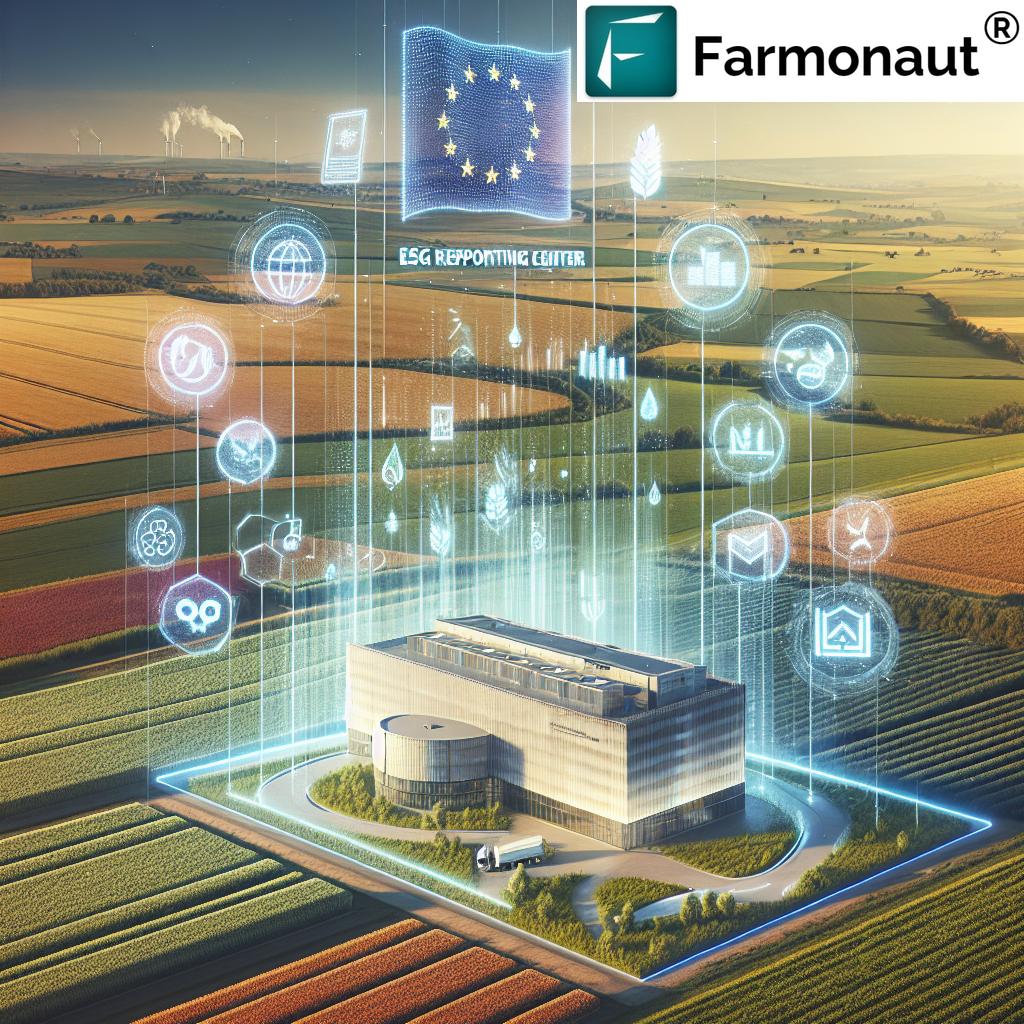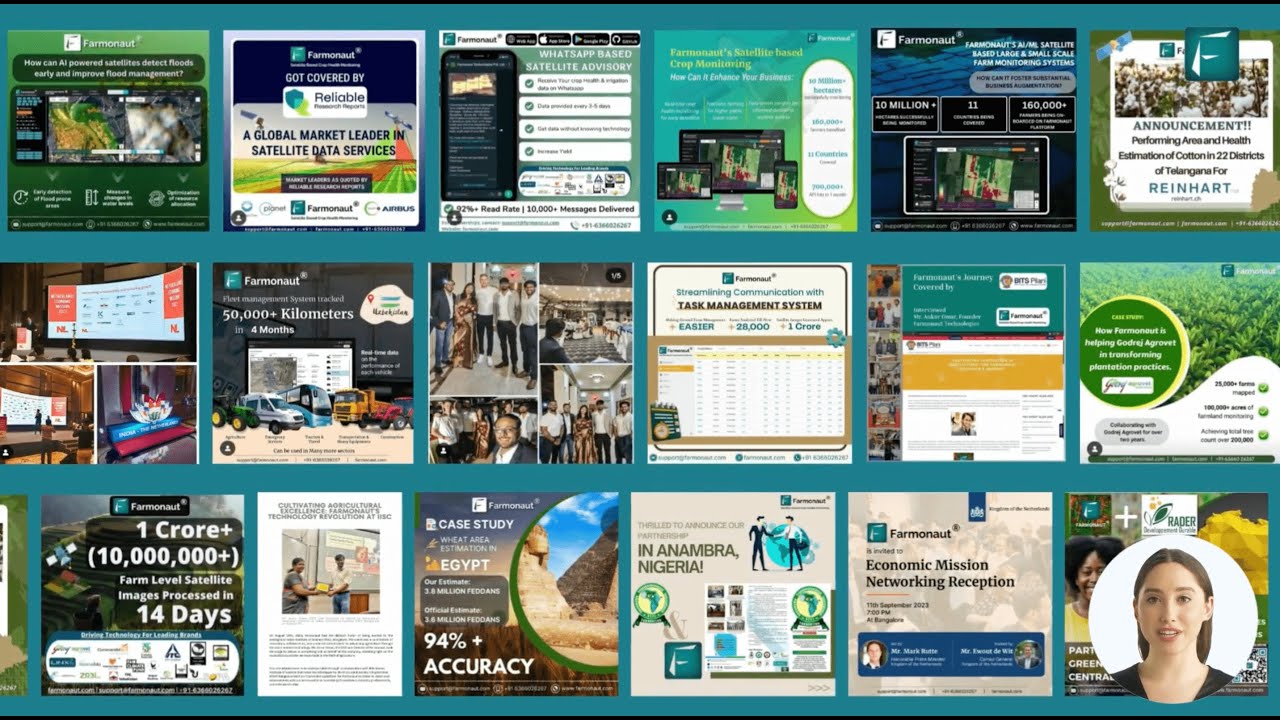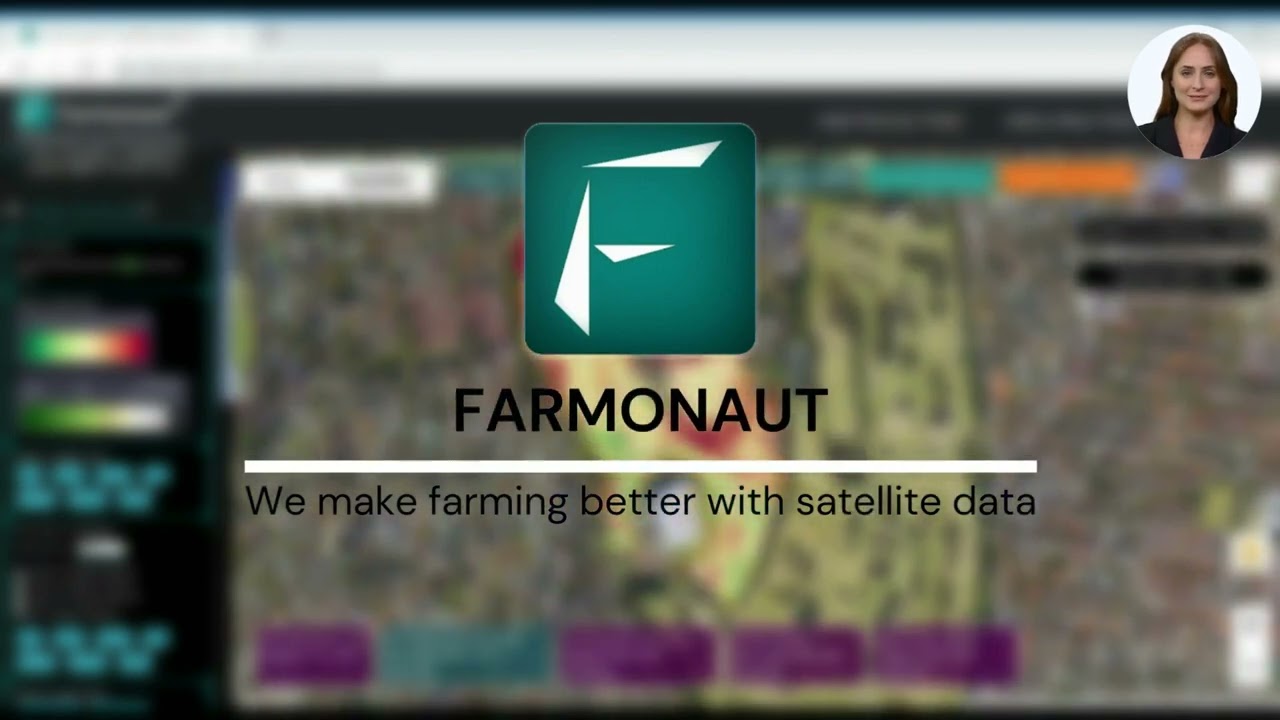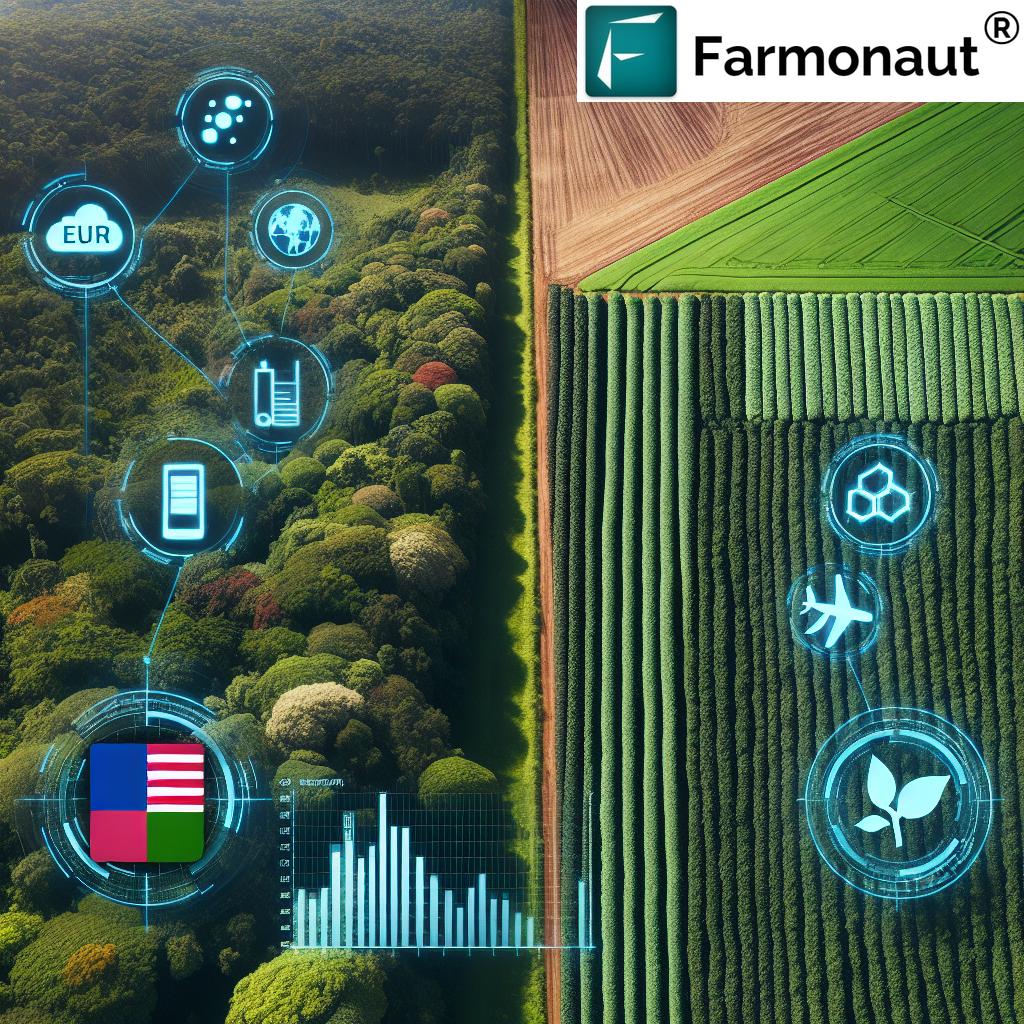Navigating EU Sustainability Compliance: Essential Strategies for Corporate Due Diligence and ESG Reporting
“The EU Deforestation Regulation impacts over 70% of global agricultural trade, affecting millions of businesses worldwide.”
In an era where sustainability has become a cornerstone of corporate responsibility, navigating the complex landscape of EU sustainability regulations has never been more crucial. As we delve into the intricacies of corporate sustainability compliance, we at Farmonaut are committed to providing insights and solutions that empower businesses to meet these evolving challenges head-on.
The European Union has been at the forefront of implementing stringent sustainability measures, and with good reason. The impending EU Deforestation Regulation is set to revolutionize how companies approach their supply chains and environmental impact. In this comprehensive guide, we’ll explore the essential strategies for corporate due diligence and ESG reporting, with a particular focus on how these regulations affect sustainable agriculture practices.

As we navigate this complex terrain, it’s essential to understand that compliance is not just about meeting regulations—it’s about embracing a new paradigm of business that prioritizes environmental stewardship and social responsibility. Let’s embark on this journey together, exploring how companies can not only comply with EU directives but also thrive in a sustainability-focused future.
Understanding the EU Sustainability Landscape
The European Union has set ambitious targets to combat climate change and promote sustainable practices across all sectors. The EU sustainability regulations are designed to create a more resilient and environmentally friendly economy. Key initiatives include:
- The European Green Deal
- The EU Taxonomy for Sustainable Activities
- The Corporate Sustainability Reporting Directive (CSRD)
- The EU Deforestation Regulation
These regulations are interconnected, forming a comprehensive framework that aims to transform the European economy into a modern, resource-efficient, and competitive one. For businesses operating within or trading with the EU, understanding and complying with these regulations is not just a legal requirement but a strategic imperative.
The EU Deforestation Regulation: A Game-Changer for Sustainable Agriculture
The EU Deforestation Regulation stands out as a pivotal piece of legislation that will significantly impact global supply chains, particularly in the agricultural sector. This regulation aims to minimize the EU’s contribution to deforestation and forest degradation worldwide by setting stringent requirements for products entering the EU market.
Key aspects of the EU Deforestation Regulation include:
- Mandatory due diligence for companies importing specific commodities
- Traceability requirements for products linked to deforestation
- Enhanced cooperation with producer countries to address root causes of deforestation
For agricultural businesses, this means implementing robust systems to ensure that their products are not linked to deforestation or forest degradation. This is where innovative technologies, such as those offered by Farmonaut, come into play. Our satellite-based monitoring systems and blockchain-enabled traceability solutions can help companies meet these stringent requirements efficiently and cost-effectively.
ESG Reporting: The Cornerstone of Corporate Sustainability
ESG reporting has become a critical component of corporate communication and strategy. It provides stakeholders with a comprehensive view of a company’s environmental, social, and governance performance. As EU regulations evolve, the importance of transparent and accurate ESG reporting cannot be overstated.
“ESG reporting has grown by 400% in the last decade, with 90% of S&P 500 companies now publishing sustainability reports.”
Best practices for ESG reporting include:
- Aligning with recognized frameworks such as GRI, SASB, or TCFD
- Ensuring data accuracy and reliability through robust collection and verification processes
- Providing context and setting clear, measurable targets
- Demonstrating the link between sustainability performance and business strategy
At Farmonaut, we understand the challenges of collecting and reporting accurate environmental data, especially in the agricultural sector. Our AI-powered advisory system, Jeevn AI, can help companies track and report on key sustainability metrics, making ESG reporting more efficient and insightful.
Supply Chain Due Diligence: A Crucial Step Towards Compliance
Supply chain due diligence is at the heart of many EU sustainability regulations. It requires companies to identify, prevent, mitigate, and account for negative impacts in their supply chains. This process is particularly crucial for businesses in the agricultural sector, where supply chains can be complex and span multiple countries.
Key elements of effective supply chain due diligence include:
- Mapping the entire supply chain, from raw materials to end products
- Conducting risk assessments to identify potential environmental and social impacts
- Implementing monitoring and verification systems
- Establishing grievance mechanisms for stakeholders
Farmonaut’s blockchain-based traceability solutions can play a vital role in enhancing supply chain transparency. By providing a secure and immutable record of product journeys, we help companies meet due diligence requirements while building trust with consumers and regulators alike.

Stakeholder Engagement: Building Sustainable Partnerships
Stakeholder engagement in sustainability is not just a regulatory requirement; it’s a strategic imperative. Engaging with stakeholders helps companies identify material issues, manage risks, and create shared value. In the context of EU sustainability regulations, effective stakeholder engagement can provide valuable insights and support for compliance efforts.
Best practices for stakeholder engagement include:
- Identifying and prioritizing key stakeholders
- Developing tailored engagement strategies for different stakeholder groups
- Establishing regular communication channels and feedback loops
- Incorporating stakeholder input into decision-making processes
At Farmonaut, we recognize the importance of collaboration in driving sustainable agriculture. Our platform facilitates connections between farmers, agribusinesses, and other stakeholders, fostering a community-driven approach to sustainability.
Conducting Effective Sustainability Impact Assessments
A sustainability impact assessment is a crucial tool for companies looking to align with EU regulations and improve their environmental performance. These assessments help identify potential positive and negative impacts of business activities on sustainability factors.
Key steps in conducting a sustainability impact assessment include:
- Defining the scope and boundaries of the assessment
- Identifying relevant sustainability indicators
- Collecting and analyzing data
- Evaluating impacts and developing mitigation strategies
- Monitoring and reporting on progress
Farmonaut’s satellite-based crop health monitoring and carbon footprinting tools can provide valuable data for sustainability impact assessments in the agricultural sector. By offering real-time insights into environmental metrics, we enable companies to make data-driven decisions that enhance their sustainability performance.
Corporate Sustainability Training: Empowering Your Workforce
Corporate sustainability training is essential for building a culture of responsibility and ensuring that all employees understand their role in achieving sustainability goals. As EU regulations become more complex, investing in training programs becomes increasingly important.
Effective sustainability training programs should cover:
- Overview of relevant EU sustainability regulations
- Company-specific sustainability policies and targets
- Practical skills for implementing sustainable practices
- Case studies and best practices from industry leaders
While Farmonaut doesn’t directly provide corporate training services, our platform can serve as a valuable educational tool. Through our AI-powered advisory system and real-time monitoring capabilities, we offer hands-on learning experiences that can complement formal training programs.
Environmental Governance for Businesses: Structuring for Success
Environmental governance for businesses involves creating structures and processes that enable effective management of environmental risks and opportunities. As EU regulations evolve, robust governance frameworks become increasingly critical for ensuring compliance and driving sustainable performance.
Key elements of effective environmental governance include:
- Clear leadership commitment and accountability
- Integration of sustainability into business strategy
- Establishment of environmental policies and management systems
- Regular review and improvement of environmental performance
Farmonaut’s comprehensive farm management solutions can support environmental governance efforts by providing real-time data and insights. Our platform enables businesses to track their environmental performance, set targets, and make informed decisions that align with their sustainability goals.
EU Alignment Strategies: Navigating the Regulatory Landscape
Developing effective EU alignment strategies is crucial for businesses looking to comply with sustainability regulations. These strategies should be comprehensive, flexible, and integrated into overall business planning.
Key components of an EU alignment strategy include:
- Conducting a gap analysis to identify areas of non-compliance
- Developing a roadmap for addressing compliance gaps
- Implementing systems and processes to meet regulatory requirements
- Regularly reviewing and updating the strategy to reflect regulatory changes
At Farmonaut, we stay abreast of EU regulatory developments to ensure that our solutions remain aligned with current requirements. Our platform’s modular design allows businesses to adapt their sustainability efforts as regulations evolve, providing a flexible approach to compliance.
Materiality Assessments: Focusing on What Matters Most
A materiality assessment is a critical process that helps companies identify and prioritize the sustainability issues that are most relevant to their business and stakeholders. In the context of EU sustainability regulations, materiality assessments can guide compliance efforts and reporting strategies.
Steps in conducting a materiality assessment include:
- Identifying potential material topics
- Engaging with stakeholders to gather input
- Analyzing the importance of topics to both the business and stakeholders
- Prioritizing topics based on their significance
- Validating and reporting on the results
Farmonaut’s data analytics capabilities can support materiality assessments by providing insights into key environmental metrics relevant to the agricultural sector. Our platform can help companies identify and track material issues related to crop health, resource management, and carbon emissions.
Managing Sustainability Risks and Opportunities
Effectively managing sustainability risks and opportunities is essential for long-term business success in the face of EU regulations. This involves identifying potential risks, developing mitigation strategies, and capitalizing on opportunities presented by the shift towards sustainability.
Key aspects of sustainability risk management include:
- Conducting regular risk assessments
- Integrating sustainability risks into enterprise risk management frameworks
- Developing scenario analyses to anticipate future challenges
- Identifying and pursuing sustainability-related business opportunities
Farmonaut’s predictive analytics and real-time monitoring capabilities can play a crucial role in identifying and managing sustainability risks in agriculture. By providing early warning systems for crop health issues and resource depletion, we help businesses proactively address potential risks and seize opportunities for improvement.
Ensuring Transparent and Accurate Reporting
Transparent and accurate reporting is the cornerstone of effective sustainability compliance. As EU regulations become more stringent, companies must ensure that their reporting practices meet the highest standards of integrity and clarity.
Best practices for transparent and accurate reporting include:
- Implementing robust data collection and verification processes
- Providing context and explanations for reported metrics
- Disclosing both positive and negative aspects of performance
- Engaging third-party assurance for key sustainability data
Farmonaut’s blockchain-based traceability solutions and real-time monitoring systems provide a foundation for transparent and accurate reporting. By offering verifiable data on agricultural practices and environmental impacts, we help companies build trust with stakeholders and meet regulatory reporting requirements.
Leveraging Technology for Sustainability Compliance
Technology plays a crucial role in enabling companies to meet EU sustainability regulations efficiently and effectively. From data collection and analysis to reporting and stakeholder engagement, innovative solutions can streamline compliance efforts and drive performance improvements.
Key technologies for sustainability compliance include:
- Satellite-based monitoring systems
- Blockchain for supply chain traceability
- Artificial intelligence for predictive analytics
- Internet of Things (IoT) for real-time data collection
Farmonaut’s suite of technologies, including our satellite-based crop health monitoring, AI-powered advisory system, and blockchain-based traceability solutions, are specifically designed to support sustainability compliance in the agricultural sector. By leveraging these tools, companies can enhance their ability to meet EU regulations while improving overall environmental performance.
EU Sustainability Compliance Checklist
| Compliance Area | Requirement Description | Compliance Status | Action Items | Farmonaut Solution | Estimated % of Companies Compliant |
|---|---|---|---|---|---|
| EU Deforestation Regulation | Implement due diligence system for deforestation-free supply chains | In Progress | Develop traceability system, conduct risk assessments | Blockchain-based traceability, Satellite monitoring | 30% |
| ESG Reporting | Prepare comprehensive sustainability reports aligned with EU standards | Compliant | Enhance data collection, align with CSRD requirements | AI-powered data analytics, Real-time monitoring | 60% |
| Supply Chain Due Diligence | Conduct thorough risk assessments and implement mitigation strategies | Non-Compliant | Map supply chain, establish monitoring systems | Blockchain traceability, AI risk assessment | 40% |
| Stakeholder Engagement | Develop and implement comprehensive stakeholder engagement strategy | In Progress | Identify key stakeholders, establish communication channels | Digital platform for stakeholder interaction | 50% |
Conclusion: Embracing Sustainability as a Business Imperative
As we’ve explored throughout this comprehensive guide, navigating EU sustainability compliance is a complex but essential journey for businesses operating in or trading with Europe. The landscape of regulations is evolving rapidly, with initiatives like the EU Deforestation Regulation set to transform supply chains and business practices across industries.
At Farmonaut, we’re committed to supporting businesses in their sustainability efforts, particularly in the agricultural sector. Our innovative technologies, from satellite-based monitoring to blockchain traceability, provide powerful tools for companies looking to enhance their environmental performance and meet regulatory requirements.
By embracing sustainability not just as a compliance issue but as a core business strategy, companies can position themselves for long-term success in an increasingly environmentally conscious market. The journey towards full compliance with EU sustainability regulations may be challenging, but it also presents numerous opportunities for innovation, efficiency, and stakeholder engagement.
As we move forward, let’s remember that sustainability is not just about meeting regulations—it’s about creating a better, more resilient future for our businesses, our communities, and our planet. Together, we can navigate the complexities of EU sustainability compliance and drive positive change in the process.
FAQ Section
Q: What is the EU Deforestation Regulation?
A: The EU Deforestation Regulation is a legislative initiative aimed at minimizing the EU’s contribution to global deforestation by setting strict requirements for products entering the EU market. It mandates due diligence processes for companies importing specific commodities linked to deforestation.
Q: How can companies prepare for EU sustainability regulations?
A: Companies can prepare by conducting thorough gap analyses, implementing robust data collection and reporting systems, engaging with stakeholders, and leveraging technology solutions like those offered by Farmonaut for improved environmental monitoring and supply chain traceability.
Q: What role does ESG reporting play in EU sustainability compliance?
A: ESG reporting is crucial for demonstrating compliance with EU sustainability regulations. It provides a comprehensive view of a company’s environmental, social, and governance performance, helping stakeholders assess the company’s sustainability efforts and risk management practices.
Q: How can Farmonaut’s solutions support sustainability compliance?
A: Farmonaut offers a range of technologies, including satellite-based crop monitoring, AI-powered advisory systems, and blockchain-based traceability solutions. These tools can help companies meet regulatory requirements by providing accurate data for reporting, enhancing supply chain transparency, and improving overall environmental performance.
Q: What are the key challenges in implementing sustainability compliance measures?
A: Key challenges include the complexity of regulations, data collection and verification difficulties, supply chain transparency issues, and the need for significant organizational change. Overcoming these challenges often requires a combination of strategic planning, technological innovation, and cultural transformation within organizations.
To learn more about how Farmonaut can support your sustainability compliance efforts, visit our website or explore our range of solutions:
API: Explore our API
API Developer Docs: Access Developer Documentation
By leveraging these tools and staying informed about evolving regulations, businesses can not only achieve compliance but also drive sustainable growth and innovation in the years to come.




















